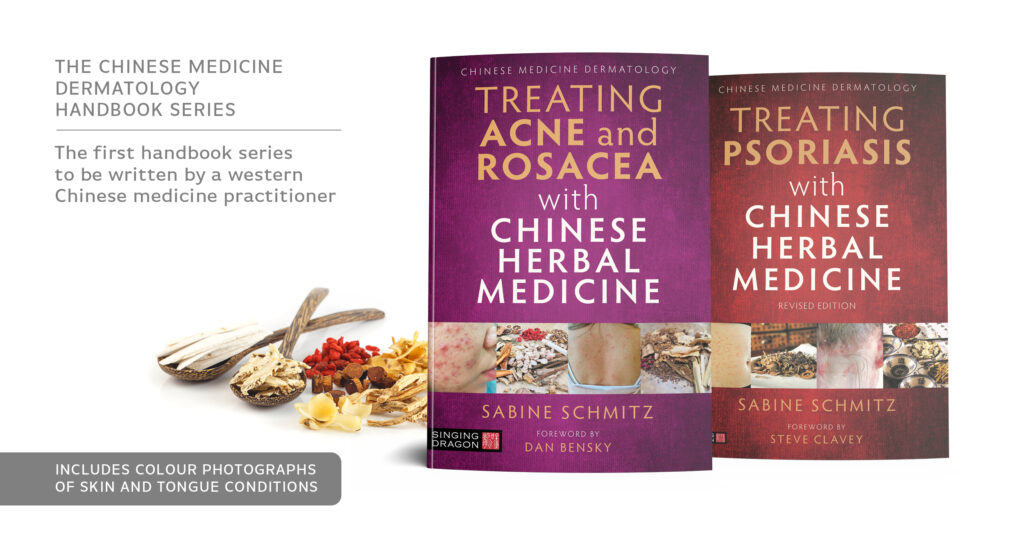Written by Sabine Schmitz
In my Chinese Medicine Dermatology book series Treating Psoriasis with Chinese Herbal Medicine and Treating Acne and Rosacea with Chinese Herbal Medicine, I extensively discuss the topics of nutrition and lifestyle habits. Today, let’s shift our focus to another pivotal factor influencing skin health: smoking (nicotine).
We all know that smoking is detrimental to our overall health. The adverse effects of tobacco consumption extend to nearly every organ in the body, with the skin being no exception. In this article, we will unveil the specific reasons behind this and explore the intricate impact that smoking has on our skin.

Long-Term Effects of Smoking
In the long run, smoking can lead to symptoms such as decreased performance, susceptibility to infections, shortness of breath, smoker’s cough, or cold hands and feet due to poor circulation. In severe cases, smoking in later stages can also contribute to dangerous conditions such as COPD (chronic obstructive pulmonary disease), lung cancer, stroke, or even heart attack. The latter is caused by arteriosclerosis, a narrowing of blood vessels due to nicotine.
Unveiling the Skins Aging Journey: The Impact of Smoking on Skin Health
Smoking hastens the ageing process of the skin, making the external appearance quickly appear aged. I specialize in TCM Dermatology and in my daily practice, I also see many patients with inflammatory skin diseases. Smoking may be related to this.
Take a look at the face of a chronic smoker. The skin is often dry and full of wrinkles, making smokers look much older than they actually are. The complexion is pale, and the face often appears gray and less rosy. The chemicals contained in cigarettes are responsible for this. One such chemical is nicotine. There are countless more, including tar, arsenic, acetone, lead, cadmium, and formaldehyde, to name just a few. A significant portion of these chemicals is toxic, and some are even carcinogenic. All these chemicals permeate the body structures and damage our skin by disrupting collagen production, narrowing blood vessels, and affecting the immune system. Let’s take a closer look at each point to understand how smoking ages our skin.
Less collagen, more wrinkles
Nicotine, on the one hand, causes collagen and elastin fibers to break down faster. On the other hand, it leads to a reduction in their regeneration.
Collagen and elastin are primarily responsible for the tightness and elasticity of the skin. Our skin remains flexible, smooth, and supple with a well-functioning collagen and elastin balance. However, when these two proteins are disrupted in their function, the skin begins to sag, becoming less firm and elastic. As a result, wrinkles form, and facial skin appears looser and older.
Poorer circulation, dry skin
As mentioned earlier, nicotine also narrows blood vessels. The skin receives less blood supply and, consequently, less moisture. The carbon monoxide inhaled while smoking further impairs the transport of oxygen to the tissues, worsening the skin’s nourishment. Oxygen deficiency ensues, causing the skin to dry out, become pallid, and appear “wilted.”
Disrupted collagen production and poor circulation can also lead to slower wound healing, as important nutrients, minerals, and oxygen no longer adequately supply the injured tissue. Wounds heal less effectively, and germs can more easily penetrate. As a result, smokers may face stronger challenges with persistent infections, such as after an injury or surgery. Once the wounds finally heal, unsightly scars often remain.
More inflammatory skin conditions like acne and psoriasis
Cigarette smoking weakens the immune system cells and significantly lowers the immune defence. This makes smokers much more vulnerable to infections! They get sick more often, and there is an increased risk of bacterial, viral, and inflammatory diseases.
For instance, practice shows that smokers have a much higher risk of developing inflammatory skin conditions like eczema, acne, rosacea, psoriasis, or other allergic diseases such as asthma and hay fever.
Lifestyle Choices and Skin Health: The Transformative Effects of Quitting Smoking
Your lifestyle includes not only nutrition, sleep habits, exercise, and work-life balance but also risk factors like smoking. They have a tremendous impact on your health and the appearance of your skin. So, it’s truly worthwhile for smokers to consider quitting for their own benefit. Immediate cessation of smoking has shown improvements in many areas, such as:
- Circulation
- Fitness
- Respiratory function
- Stabilization of the immune system
- Improvement of skin texture and complexion.
You will be amazed at how quickly positive changes become evident!
Traditional Chinese Medicine and Skin Diseases
Chronic skin conditions are often challenging and necessitate prolonged treatment. The impact of these conditions on patients’ quality of life is substantial, primarily due to the visible effects on their skin. Traditional Chinese Medicine (TCM) stands out with its diverse treatment approaches, flexible application, high effectiveness, low recurrence, and minimal side effects. TCM can contribute to the attainment of healthier skin and an improved overall appearance.
TCM has even more to offer!
To improve skin health and provide patients with comprehensive TCM services, Sabine has developed her own skincare line infused with TCM herbs. Found out more at www.chinamed-cosmetics.com
Sabine is the author of the Chinese Medicine Dermatology Handbook Series, which includes the titles Treating Acne and Rosacea with Chinese Herbal Medicine (2022) and Treating Psoriasis with Chinese Herbal Medicine (2020). Her new book Treating Eczema and Neurodermatitis with Chinese Herbal Medicine is publishing with Singing Dragon in September 2024. Packed with information about these conditions that can’t be found in any other book! Sign up to our mailing list to be the first to hear about pre-order information for the new book: https://pages.hachette.co.uk/sguk-newsletter-sign-up/